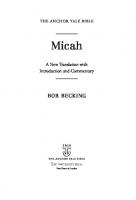Aristotle's Political Philosophy in Its Historical Context: A New Translation and Commentary on Politics Books 5 and 6 1138570710, 9781138570719
This book offers new translations of Aristotle's Politics 5 and 6, accompanied by an introduction and commentary, t
246 66 3MB
English Pages 220 [230] Year 2017
Recommend Papers

- Author / Uploaded
- Andrew Lintott
File loading please wait...
Citation preview
ARISTOTLE'S PO ITICAL PHILOOPHYIN ITS HISTORICACONTEXT A NEWTRANSLATION ANDCOMMENTARY ON POLITICS BOOKS 5 AND6
-
~
---
~
-
-
-
--
-
~
Aristotle's Political Philosophy in its Historical Context
'Andrew Lintott deploys his expertise - and few people know more about ancient political disorder - to make the riches of the Politics more accessible to those without a background in ancient philosophy. Expanding Aristotle's often infuriatingly brief historical examples, and explaining the context of his project as a whole, Lintott's analysis and commentary offer a timely primer on ancient ideas about political decline and change.'
CarolAtack, St Hugh s College, University of Oxford, UK
This book offers new translations of Aristotle's Politics 5 and 6, accompanied by an introduction and commentary, targeted at historians and those who lil(e to read political science in the context in which it was produced. Philosophical analysis remains essential and there is no intention to detract from the books as political theory, but the focus of this volume is the text as a crucial element in the discourse of fourth-century Greece, and the conflict throughout the Greel( world between democracy, oligarchy, and the rise of the Macedonian monarchy.
Andrew Lintott is Emeritus Professor of Worcester College, University of Oxford, UK.
Taylor & Francis Taylor & Francis Group http~/ /tay lora ndfra nc is.com
Aristotle's Political Philosophy in its Historical Context A New Translation and Commentary on Politics Books 5 and 6
Andrew Lintott
~:::o~
Routledge
~
Taylor & Francis Group
LONDON AND NEW YORK
First published 2018 by Routledge 2 Park Square, Milton Park, Abingdon, Oxon OX14 4RN and by Routledge 711 Third Avenue, New York, NY 10017
Routledge is an imprint of the Taylor & Francis Group, an informa business © 2018 Andrew Lintott
The right of Andrew Lintott to be identified as author of this work has been asserted by him in accordance with sections 77 and 78 of the Copyright, Designs and Patents Act 1988. All rights reserved . No part of this book may be reprinted or reproduced or utilised in any form or by any electronic, mechanical , or other means, now known or hereafter invented, including photocopying and recording, or in any information storage or retrieval system, without per1nission in writing from the publishers.
Trademark notice : Product or corporate names may be trademarks or registered trademarks, and are used only for identification and explanation without intent to infringe. British Library Cataloguing-in-Publication Data A catalogue record for this book is available from the British Library Library of Congress Cataloging-in-Publication Data A catalog record for this title has been requested
ISBN: 978-1-138-57071-9 (hbk) ISBN: 978-0-203- 70331-1 (ebk) Typeset in Times New Roman by Sunrise Setting Ltd, Brixham, UK
Dedicated to my present and former colleagues
Taylor & Francis Taylor & Francis Group http~/ /tay lora ndfra nc is.com
Contents
Preface Abbreviations and texts
•••
Vlll •
lX
1
Introduction
1
2
The Politics - themes, structure, and chronology
3
3
Political change and civil strife in Politics Bool< 5
11
4
Aristotle's theory of political change
27
5
Aristotle and democracy
31
6
Aristotle's preference - the politeia
41
7
The Politics, Macedon, and Macedonian sympathisers
55
8
The Politics and ethical theory
58
Politics Bool< 5, sections 1-12
61
Commentary on Politics Book 5
88
Politics Bool< 6, sections 1-8
157
Commentary on Politics Book 6
169
Bibliography Index of ancient texts Index of proper names
197 205 215 218
Index of subjects
Preface
I came to the Politics late. I cannot have read more than a few chapters while I was an undergraduate or postgraduate. When I turned to it (in the 1970s) while writing my book on violence and civil strife in the classical city, I was strucl< by how little there was in English to help those reading it, apart from Newman's great commentary - now over 100 years old. Furthermore, although writers on ancient Greek history frequently cited passages from it, they rarely, if ever, tried to put this into the context of the argument of the work. I made a brief start on this in a chapter of the book on violence. My research, however, then turned largely to Roman matters for the next twenty-five years - apart from two pieces on 'Aristotle and Democracy' (1992) and 'Aristotle and the Mixed Constitution' (2000). When I wrote these pieces, it still seemed to me that despite some specialised work and the valuable edition by Trevor Saunders of Bool







![Romans: A New Translation with Introduction and Commentary [33]
0385233175](https://ebin.pub/img/200x200/romans-a-new-translation-with-introduction-and-commentary-33-0385233175.jpg)

